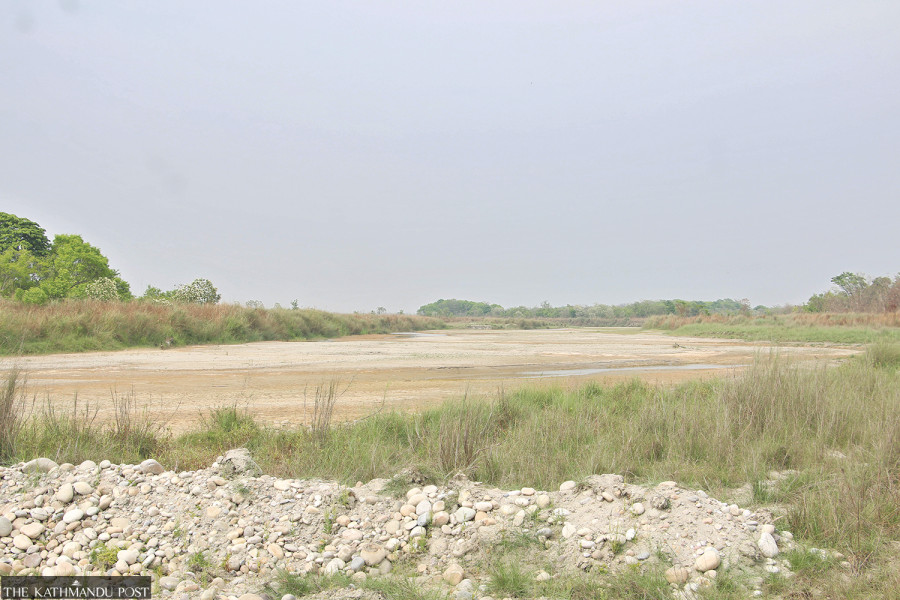National
Work begins to dredge silt to restore Geruwa River
Conservationists have been raising concerns about the dire situation of wildlife in Bardiya National Park due to water shortage.
Dipendra Baduwal & Kamal Panthi
Authorities have taken initiatives to dredge silt and increase water flow in the Geruwa river, an offshoot of the Karnali. The move comes as conservationists have been raising alarms as wildlife in the Bardiya National Park (BNP) have been highly affected by the drying up of water sources, mainly in the Geruwa area.
The Department of National Parks and Wildlife Conservation and the Water Resources and Irrigation Development Division Office in Bardiya started clearing silt in the Lalmatiya area to increase water flow in the Geruwa river that passes through the national park.
“We got permission from the department to dredge the silt. The silt-removal work in the Lalmatiya area will start from Monday. We could not start the work on time due to the delay in obtaining permission from the Department of National Parks and Wildlife Conservation,” said Krishna Bahadur BK, chief at the Water Resources and Irrigation Development Division Office in Bardiya. According to him, the task will be completed in about a month.
On Sunday, a joint team of the Bardiya National Park and the Water Resources and Irrigation Development Division Office inspected the Lalmatiya area and completed the survey. It is estimated that around 90,000 cubic metres of pebbles and stones are piled up in Lalmatiya. “We will remove the silt by using excavators in four different places,” said BK.
The Karnali, the country’s longest water system, is the main source of freshwater for the wild animals in the Bardiya National Park. A sharp decline in the water flow in Geruwa river, an offshoot of the Karnali River a few kilometres downstream from Chisapani, has affected wildlife in the western part of the national park.
Over the past few years, Geruwa River has been gradually shifting its course away from the main stream of Karnali. As a result, the water flow has declined sharply, as floods in the past have deposited much silt in Lalmatiya, and unchecked extraction of riverbed materials along the offshoot in the Kailali side.
Until seven years ago, Geruwa was the main offshoot of the Karnali river. According to conservationists, dolphins and various fish species were found in the Geruwa when water was abundant. Water flow in the Geruwa river started declining over the past seven years.
There are several offshoots of the Geruwa river; among them, the Khauraha is the main. Several other offshoots that pass through the national park area have already turned into sand beds, causing troubles to animals as well as the local residents.
Various irrigation canals that drain water from the Karnali river are drying up now. People are dependent on underground water, but the level of underground water is also dwindling in the area over the past three-four years.
“Several irrigation canals in Thakurbaba, Madhuwan, Geruwa and western Rajapur areas are drying up now with the decreasing water flow in the Geruwa river. Farmers as well as tourism entrepreneurs are hugely affected,” said Jaman Singh KC, chairman of Geruwa Rural Municipality.
Authorities have yet to find a permanent solution to increase the water flow in the Geruwa river. While the authorities carry out partial silt clearance annually, but the floods replenish stones and sand. According to conservationists, silt should be removed before mid-March, but the work has been delayed this year.
“The authorities should find a long term solution as the riverbed materials are deposited, forming a natural dam, obstructing water flow in the Geruwa. Decreasing water flow in the offshoot has hugely affected wildlife and aquatic animals,” said Ashok Ram, chief conservation officer at the Bardiya National Park.
As the wild animals in the national park are affected from the dwindling water sources, the Lumbini provincial government allocated Rs 20 million as contingency fund to clear silt in the headwaters of the Geruwa river. However, the Water Resources and Irrigation Development Division Office could not start the work to clear the silt due to delays in obtaining permission from the department.
According to Hemanta Acharya, chairman of Thakurbaba Buffer Zone Consumers’ Committee, the Department of National Parks and Wildlife Conservation issued permission to clear the silt after various broadsheet dailies including The Kathmandu Post published news about the hardship of wildlife due to water sources depletion.




 22.64°C Kathmandu
22.64°C Kathmandu













